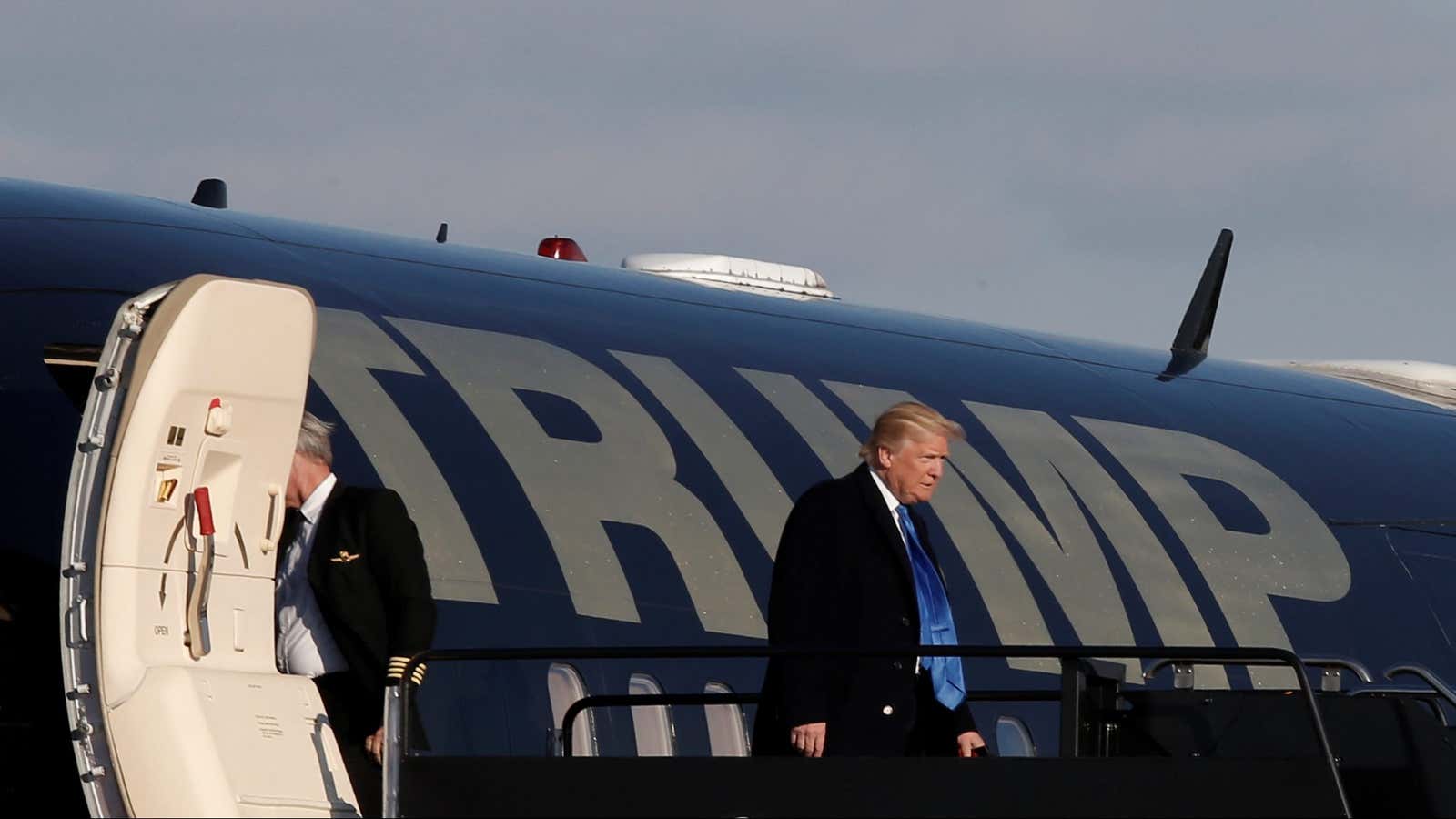Updated with Trump’s late-night tweets just before midnight ET on Dec. 12.
When Donald Trump promised last month that on Dec. 15 he would be leaving his “great business in total,” there were already doubts about how he could separate himself from all possible conflicts of interest. On Tuesday evening, he postponed the announcement until January, leaving the American public and the rest of the US government with no idea what ties he may have to foreign governments and companies as he heads into the country’s highest office.
This means the Electoral College is due to vote on Dec. 19 on whether to approve his candidacy, officially making him president, without knowing how he plans to avoid violating the emoluments clause of the Constitution. That’s a tricky situation for the college, a body set up, in the words of founding father Alexander Hamilton, as an obstacle “to cabal, intrigue, and corruption,” and to ensure “that the office of President will never fall to the lot of any man who is not in an eminent degree endowed with the requisite qualifications.”
Former White House ethics lawyers Richard Painter (a Republican who served under George W. Bush) and Norman Eisen (a Democrat who worked for Obama) detailed the gravity of the situation in a joint statement on Twitter on Dec. 13.
The bar to avoid violating the emoluments clause (which bans receiving gifts of payments from foreign states) is very high, according to Eisen and Painter. They have have written that “in order to avoid the Constitutional conflicts, he must also exit the ownership of his businesses through using a blind trust or some other equally effective disposition.”
At present, he is in debt to the state-owned Bank of China (the very same bank is a renter at Trump Tower in New York), does business with government-backed companies in the Middle East, and owns a Washington D.C. hotel that has actively courted foreign diplomats. And those are just the issues we know about: last week, we digitized everything Trump has disclosed about his businesses so far and found the document sorely lacking in information needed to make a judgement like this.
So, in making the move, Trump has essentially muddied the waters for the last institution meant to stop a corrupt or unfit person from taking office. But in appealing to the conscience of electoral college members to vote him down, Eisen and Painter face an uphill battle. So far, one Republican member has said he won’t vote for Trump; that means 36 more need to be persuaded to join him in under a week.
Eisen, for his part, hopes Trump will bow to public pressure and do the right thing, saying over email:
“He is hesitating in response to an outcry including last week’s bipartisan letter, and to the fact that two thirds of Americans are concerned about his conflicts. This is the latest in a series of backtracks by the president elect. First watchdogs complained about lobbyists in the transition. He kicked them out. Then about his kids being listed for security clearances. He blamed an intern and revoked. Then there was a furor about his son-in-law being appointed as a White House advisor in violation of nepotism laws. Trump then said maybe he’ll make the young man a Middle East peace envoy instead. Now this, after huge objections. Let’s hope he takes the additional time to do the right thing, follow every president for the past four decades, and divest into a blind trust or the equivalent.”
Trump may not go that far. In a series of late-night tweets on Dec. 12, he said he plans to leave his business before January 20, and leave his sons, Don and Eric, to manage them, adding “No new deals will be done during my term(s) in office.” That means his assets would not be in a “blind trust” favored by ethics lawyers, because he knows and would be in contact with his sons.
It is also impossible to know whether Trump will do what he says on Twitter. He has, in fact, been so reluctant to detach himself from his empire that he refused to even to give up his executive producer role on the Celebrity Apprentice, even though he would be on the payroll of a company that relies on government permits to build its casinos.
